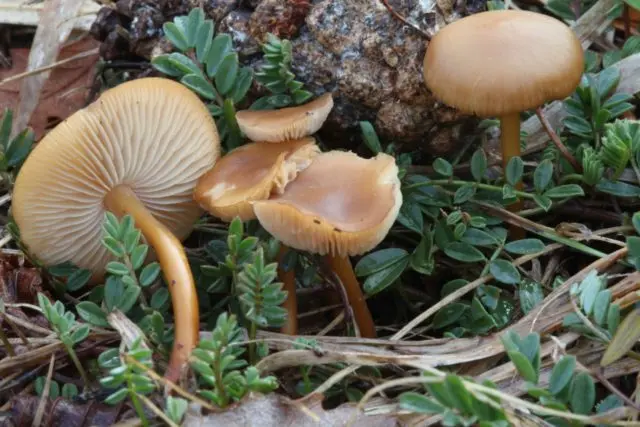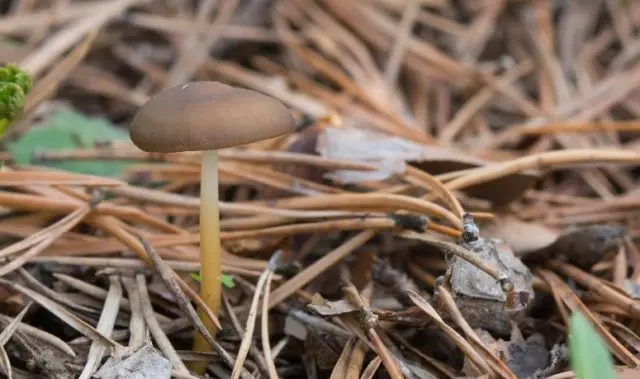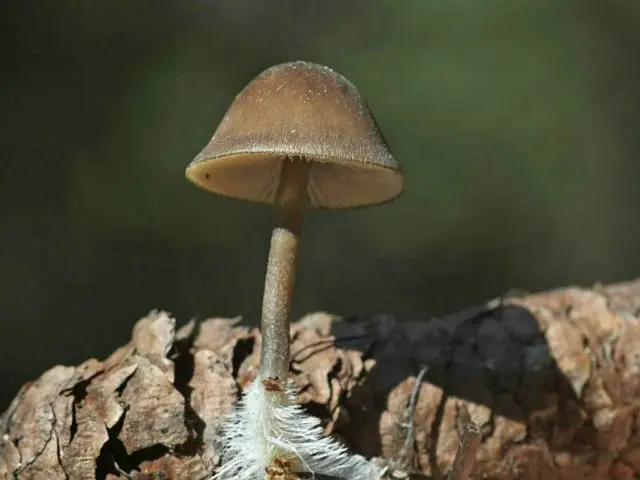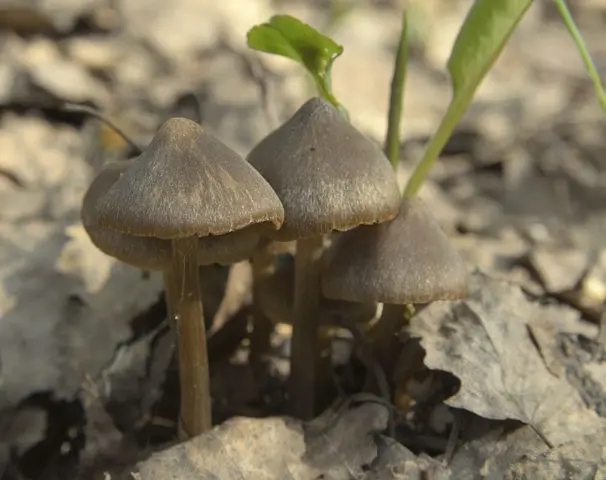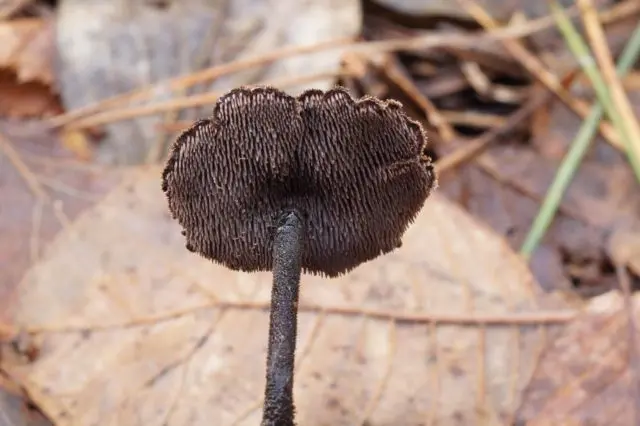Contents
In early spring, after the snow cover melts and the top layer of the earth begins to warm up, the mushroom mycelium becomes active. There are a number of early spring mushrooms characterized by rapid maturation of fruiting bodies. These include edible strobelurus. The fruiting of these mushrooms begins in mid-April and continues until hot weather sets in. This species does not tolerate the scorching sun. Under the influence of its rays, they dry out and wrinkle. But as soon as the heat subsides, the growth of representatives of this species continues with the same activity. The second stage of fruiting begins in mid-September and continues until the very frost.
Where does edible strobiliurus grow?
Edible strobiliurus can be found exclusively in spruce forests. It settles in close proximity to fallen spruce cones buried in a damp bedding. Edible strobiliurus is a saprotroph – an organism that uses dead organic tissue as food. Strobiliuruses love moist areas of spruce litter, well lit by sunlight. Only a small fruiting body is visible above the ground, and most of the fruiting body is hidden from prying eyes. It is a long and fluffy micellar thread that goes into the earth for several tens of centimeters – to where a half-decomposed spruce cone lies.
What does edible strobiliurus look like?
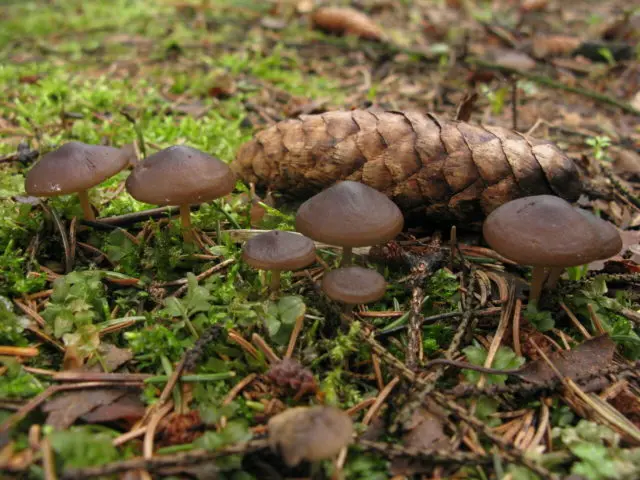
Edible strobiliurus is a very small member of the Physalacrye family with a lamellar hymenophore. The hat in adult specimens is no more than 3 cm in diameter, while in young specimens it is less than a centimeter. At first it is hemispherical, convex. Later it becomes prostrate: its edges open, leaving a central tubercle. Dry, velvety skin becomes sticky after rain. The shade of the hat can be different: cream, grayish or brown. The hymenophore is more brightly colored. It consists of frequent, slightly branched plates of medium thickness, sometimes translucent through the thin skin of the cap.
The leg of the edible strobiliurus is thin and long. Its aerial part reaches 4 cm, and the root-like micellar base goes deep into the soil and originates from a spruce cone. The leg is rigid in structure, hollow inside and therefore cannot be eaten. White or yellowish above, it darkens slightly downwards.
The pulp of the strobiliurus is dense, white. Almost all of it is contained in a thin hat. It tastes almost neutral, but has a pleasant mushroom smell.
Is it possible to eat strobiliurus edible
Strobiliurus edible can be eaten, as the name suggests. The pulp of the caps is pre-boiled, after which it is subjected to various types of cooking. Due to its small size, this mushroom species is not of economic importance. In order to feed at least one person, you will need to collect a significant amount of fruiting bodies.
The taste of the mushroom
Edible strobiliurus does not differ in valuable culinary properties. According to the classifier, it belongs to the fourth category, which includes low-value varieties with low taste, as well as little-known and rarely collected varieties. The pulp of mushrooms is very fragrant, but can be bitter, so it is subjected to preliminary boiling.
Benefits and harm to the body
Like all edible varieties, strobiliuruses are rich in valuable vegetable protein, contain carbohydrates – mushroom sugars (mycosis and glycogen), useful amino acids. They have a diverse microelement composition (phosphorus, sulfur, magnesium, potassium, calcium, chlorine) and vitamins (A, group B, C, D, PP).
False doubles
Edible strobiliurus has several related species. They must be able to distinguish, since poisonous ones are also found among edible and conditionally edible varieties.
In pine forests grow strobilurus root (twine-legged) and cuttings (astringent). These species settle only on pine cones, finding them at a depth of up to 30 cm:
- Strobiliurus cuttings classified as conditionally edible species. Its hat is up to 2 cm in diameter, convex-prostrate, matte. Its leg is thin, 0,2 cm in diameter, long, yellow with an orange tint. The flesh of representatives of this species is thin, white, in old specimens it is astringent, bitter and has an unpleasant herring smell.

- Strobilurus twinefoot edible. It has white, tasty and fragrant pulp. Its cap is convex, thin, brown to dark brown, up to 1,8 cm in diameter. Ocher or reddish leg – up to 0,4 cm. The culture bears fruit from mid-April to the first frost, sometimes it also occurs during the thaw.

- Mycena cone-loving – Another edible species related to strobiliurus, feeding on spruce cones. It bears fruit in April-May. Its representatives have a brown hat, which is larger than that of the strobiliurus, and has the shape of a bell. Its leg is fragile and slightly pubescent. The main distinguishing feature of the pulp is a sharp ammonia smell.

- entoloma spring, fruiting at the end of April, is a poisonous mushroom. His grey-brown cap fades over time. The main feature that distinguishes representatives of this species from strobiliurus is a dark brown leg.

- beospore mousetail has a hygrophanous (liquid-absorbing) pale brown cap up to 2 cm in diameter and a yellow-brown hollow leg. It bears fruit in autumn, can grow on both spruce and pine cones.

Collection rules
Edible strobiliurus is very small in size. Collecting it, you need to walk slowly through the forest, carefully examining every piece of spruce litter. Having found the mushroom, you should carefully unscrew it from the ground or cut off the leg to the very root with a sharp knife. The remaining hole must be carefully sprinkled, and the specimen found must be cleaned of the remnants of the earth and put in a basket. It is recommended to take only adult specimens with larger hats, since after boiling they are significantly reduced in size.
Use
Edible strobiliurus is most commonly eaten fried. For food, they take only mushroom caps, cutting off a hard leg. Before frying, the caps are boiled whole for 10 minutes, after which they are laid out in a pan.
Marasmic acid, found in mushrooms, is a powerful antibacterial agent. In folk medicine, powder and alcohol infusion of strobilurus are used to treat bacterial infections. These mushrooms are used as an anti-inflammatory agent in Chinese medicine.
The twin of the fungus – cutting strobiliurus – has a high fungitoxic activity. It secretes substances that inhibit the growth of other fungi that are its nutritional competitors. From this variety of strobiliurus, a substance was isolated – a fungicide of organic origin. This is strobirulin A, which is also a natural antibiotic. Based on it, scientists synthesized an artificial drug – Azoxystrobin, in which the shortcomings of the organic fungicide (sensitivity to light) were eliminated.
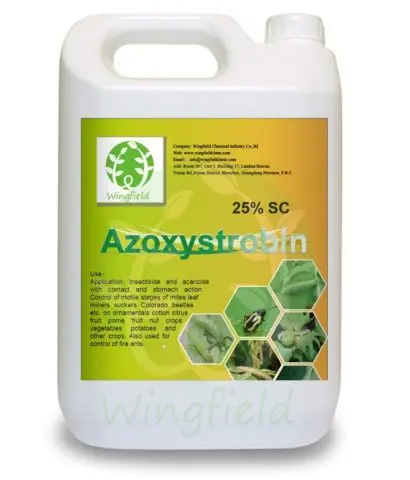
Conclusion
Edible strobiliurus is a small nondescript mushroom, but its significance is great. Together with other inhabitants of the forest, he is part of the forest community. All plants and animals in it are interconnected with each other, thanks to which the forest is a harmoniously functioning organism. Organs ensure its vital activity, and, therefore, are equally important and necessary. Due to the rich enzyme apparatus, wild mushrooms actively decompose organic residues, contribute to the formation of a fertile soil layer.










